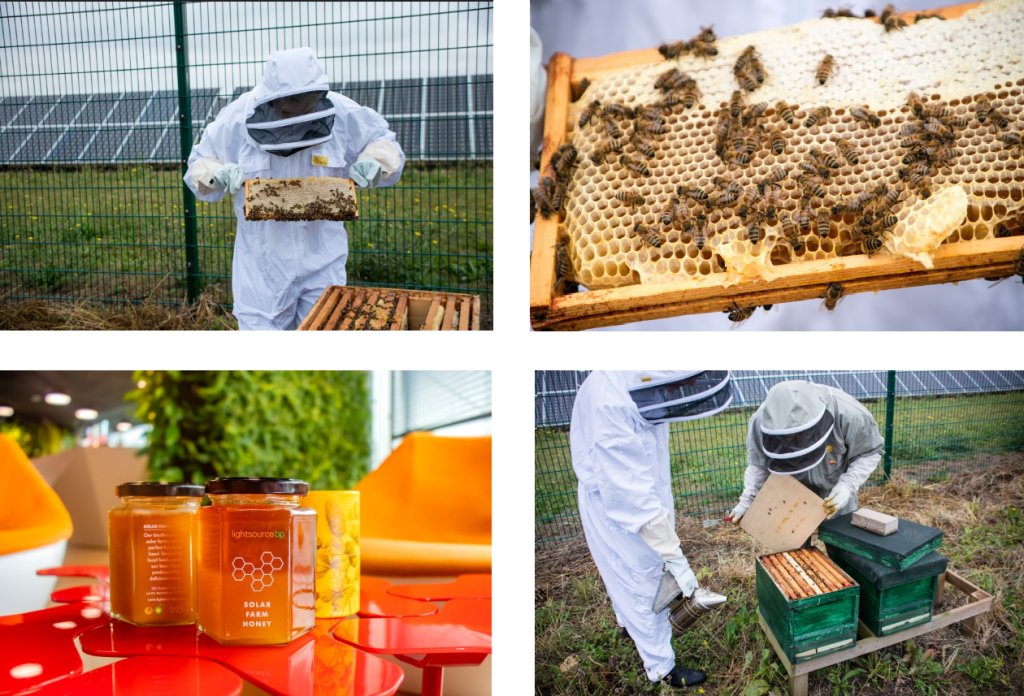Boosting biodiversity, saving bees
At Lightsource bp, one of our core values is Sustainability – as a renewable energy company, we are part of the climate change solution. A large part of that for us is generating solar electricity and reducing carbon emissions, but we’re also dedicated to improving sustainability globally in other ways.
One of our main considerations when building solar farms is making sure the installation has a positive effect on the local environment – we’re dedicated to boosting biodiversity in communities and worldwide.
The biodiversity crisis
Biodiversity refers to the variety of plant and animal life in any given habitat – generally speaking, the higher the levels of biodiversity the better. Due to climate change, industrialisation, deforestation and other human activities, we’re in the middle of a global biodiversity crisis. Numbers of species of plants and animals are falling worldwide, which will have devastating results.
Solar and Biodiversity from Lightsource bp on Vimeo.
The knock-on effect
Falling levels of biodiversity have led to a severe decline in bee populations, particularly in the western world. Almost 90% of wild plant species and over 75% of food crops depend partially on pollination by bees, butterflies and other animals, and over 40% of invertebrate pollinators (bees, butterflies, midges) are threatened with global extinction.
The absence of bees and other pollinators could be catastrophic – the annual economic value of pollinators is $235-577 billion, and studies show that in recent years crops that depend on pollinators show lower growth and stability in yield than crops that don’t. Falling bee populations are having a huge impact on the economy, as well as the natural environment.
The solar bee and honey initiative
We want to be part of the solution, and as solar land is protected from development for 30+ years, we’re in a strong position to boost biodiversity and protect pollinators. Wherever possible, we plant our sites with species-rich seed mixes to create habitats for pollinators as well as local flora and fauna. In 2015 we went one better, and began installing bee hives on the boundaries of our UK sites.
Since then, we have…
- Invested more than £20,000 into the project which supports local businesses
- Harvested 270kg (2200 jars) of honey
- Housed an estimated 1 million bees in hives across several sites
We’re not stopping there – Lightsource bp is going to roll out our solar bee farming initiative worldwide, replicating our success across our international projects in Europe, the USA, Brazil and Australia, where appropriate.
Working with Lightsource bp has provided me access to land which allows bees to thrive. Having my hives on Lightsource bp’s solar farms has also given me the peace of mind that the hives will not be tampered with as it has tight security on its land. Above all else, I’ve enjoyed working with Lightsource bp as not only is it improving the environment through providing clean electricity, but it is going above and beyond its bread and butter in an effort to boost biodiversity.
Stephen Brown, Lightsource bp Bee Farmer

Related news
03 Apr, 2025
Community hospital check presentation, job fair kick off Lightsource bp Jones City energy center in Jones County, Texas
Community partnerships in Texas
26 Mar, 2025
Lightsource bp solar project in Louisiana goes online, driving US manufacturing and local economic growth
180MW project in Louisiana




